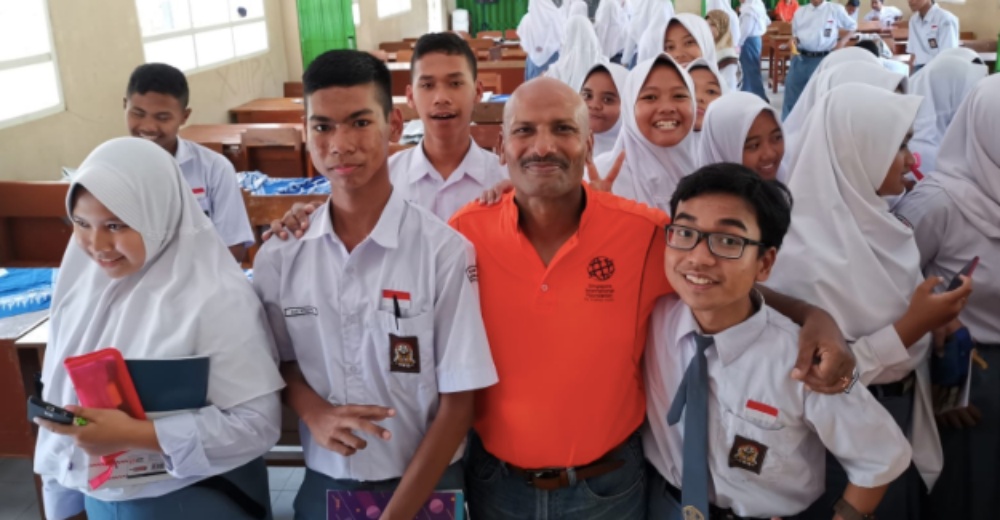At first glance, Seluasundram Nagalingam (Sundram) cuts an imposing figure.
The Master Warrant Officer, who has served 37 years with the Singapore Armed Forces (SAF) Commando unit, appears gruff and unapproachable.
This is before he started speaking with us, revealing the warmth beneath his stern exterior.
“This is sweet, this is made of rice flour, this is a bit spicy, this is made of coconut,” he says, pointing to the various idli condiments that he has bought for us, imploring us to eat with him.
We are seated at a quiet corner of Komala Villas which is sparsely populated by the morning crowd. The restaurant is one of Sundram’s favourite places for breakfast.
Over a meal of idli and Bru coffee, the army regular surprises me by revealing that the all-action man does yoga regularly.
“I’ve been doing yoga for the past 10 years but I’ve only been serious about it in the last six years,” he says earnestly, adding that he devotes an hour each day practising yoga postures, breathing, and meditation, which he says is therapeutic for him, given his penchant for extreme sports.
Even after completing close to 1,000 jumps throughout his career as a Commando, and having torn meniscus in both his knees, the man is still skydiving today at the age of 54.
“I love sports and I love parachuting. And then I came to know that the SAF Commando pays you to jump. Oh my god, that’s my hobby!” he says with a laugh.
Giving back to the Boys’ Home
Sundram’s love for physical activity started when he was a young boy at the Ramakrishna Mission Boys’ Home located at Bartley Road.
His mother didn’t have enough money to raise her six children by herself, so she left him there.
Sundram resented being “given away” by his mother.
As a result, he became involved with street gangs and chalked up a notorious reputation, taking part in fights and bullying his way up the food chain.
The Ramakrishna Boys, which Sundram was a part of, was particularly notorious in the Bartley area.
“I learned how to stand on my feet and fight back in Primary Four, Primary Five. That taught me to be independent and to fight back to show people they cannot bully me,” he chuckles.
“But when I grew up, I realised that my mother was trying to help me, so I shouldn’t be angry with her. That was when I started going back to visit my family,” he adds.
Today, Sundram sees himself in the boys at the Ramakrishna Mission Boys’ Home and devotes himself to befriending them every Sunday morning:
“I think all a person needs in life is some motivation. At times the motivation is not important. It’s that listening ear. You listen to him and tell him, ‘you are good, you are loved, you have potential, you can do it’.”
What Sundram offers is advice and his own experience, being a product of the Boys' Home. More importantly, Sundram lets these boys know that they are not alone and they are not abandoned.
“Everyone has an innate capability in them. My job is to help them unleash their potential,” he says with a twinkle in his eye.
As a Hindu, Sundram believes that service to man is service to God, and service to the downtrodden and vulnerable -- the young, the helpless, the disabled, and the elderly -- is much more valuable than visiting or giving money to temples.
Inculcating the love of reading
And the man exemplifies this type of service.
The Citizen Ambassador with the Singapore International Foundation has been actively involved in two overseas initiatives since 2013. One is the Water for Life Project in Cambodia which brings clean water technology to rural areas to provide access to clean drinking water.
Aside from that, Sundram has also travelled to Yogyakarta, Indonesia to promote learning among children via the Words on Wheels Project since 2017.
This project takes the form of a mobile library which travels to schools.
Words on Wheels is not an “aid” project for the poor, Sundram clarifies, adding that some of the children he encountered in Yogyakarta were quite well off.
“They dress well, they have footwear, and they carry smartphones. The objective of the Singapore International Foundation is to make a better world through interaction.”
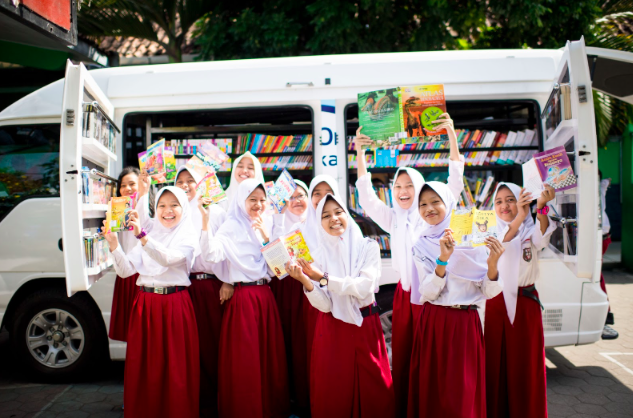 The Words on Wheels mobile library. Image by SIF.
The Words on Wheels mobile library. Image by SIF.
The Words on Wheels team visits schools and organises interactive classroom activities to promote learning and cross-cultural sharing. The team also uses the mobile library, which is stocked with Bahasa and English books, to encourage students to read.
“Once the doors open, the children can collect the books and sit outside under the shade and read,” he says.
An exchange of culture
It’s not a one-way street and through his volunteering, Sundram has found much common ground between himself and students in Yogyakarta.
“The Javanese have a lot of Indian influences in their culture so we share that. We even talked about their pancasila, their philosophy, compared to Singapore’s Total Defence,” he smiles.
Even the Indonesian and Singapore flags share common features, in terms of the colours and their symbolism.
It is this interaction and sharing of culture that Sundram gains from his experience volunteering for Words on Wheels.
The benefits of Words on Wheels may not be as immediate as, say, the improved quality of life from the water projects in Cambodia. But when I think about it, they are still valuable nonetheless because there is an exchange in cultural ideas, which Sundram says he takes back from his trips.
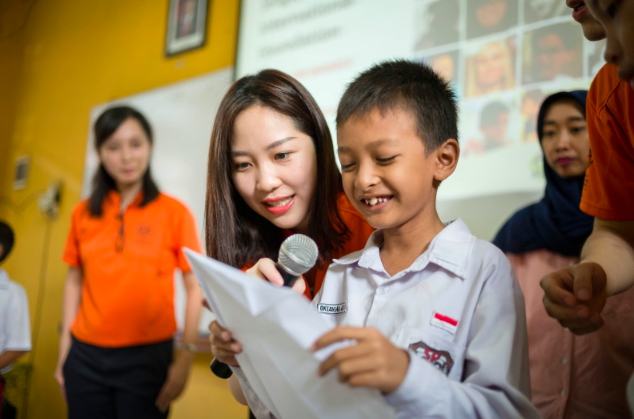 A classroom activity facilitated by Words on Wheels. Image via SIF.
A classroom activity facilitated by Words on Wheels. Image via SIF.
“The people who come from the village are very warm and they are so proud of their culture!” he says.
On Thursdays, for example, students and teachers from the rural schools will dress in their batik (traditional costume decorated with wax dye). The principal will wear his Javanese sarong adorned with a keris (dagger) and his headdress.
Apart from the rich culture, Sundram has also picked up some Javanese words.
For example, when a Javanese tells you matur nuwun (thank you), you should reply sami-sami (you’re welcome).
Matur nuwun, which has roots in Sanskrit, actually has a deeper meaning, Sundram shares.
“It means ‘My soul pays respect to your soul,” he says. “When the Javanese shared this with me, I realised, wow, they’re so cultured.”
His trips and exposure to the Javanese has taught him one thing -- that they are rich in the intangibles.
“They really embrace life and I think they’re very rich in terms of their culture. They also live for that day and they don’t worry about tomorrow,” Sundram says.
Looking at the children as tomorrow’s leaders
Each Words on Wheels trip takes about four days and covers two schools.
The actual programme runs for one day per school. However, there is a lot of preparation work that goes on behind the scenes, like prepping the mobile library, meeting the local librarians, and coordinating with the teachers.
It’s not difficult work in Indonesia, according to Sundram, as most of the coordination work is done by SIF. The foundation arranges for an in-country agent and a translator to assist the team on the ground work.
So far, Sundram has completed five Words on Wheels trips since taking it up in 2017. But it is not about the number of trips he made to Indonesia.
He found shaping the minds of the young to be worth every time and effort he spent in Indonesia.
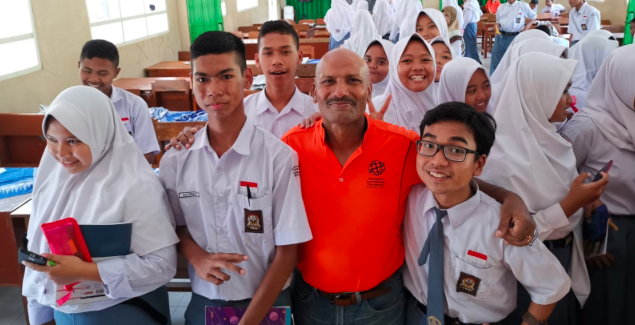 Sundram sees these students as leaders of tomorrow. Image courtesy of Sundram.
Sundram sees these students as leaders of tomorrow. Image courtesy of Sundram.
“When we interact with the children, we tell them that we see them as the next leaders of Indonesia. You could be the next president or the next leader of your country,” he says.
They get so inspired that even in primary school, they can be seen as future leaders of their country, Sundram adds.
Even the school teachers find value in the work that the Words on Wheels team does, he says.
“The teachers will come and ask me, ‘Can I have your prop? How did you do this game? Can you tell me how to simplify it?”
So what does it take for a person to help with Words on Wheels?
“A lot of people think that you have to be good in English, that you need to read books to children,” says Sundram.
The reality is that it’s more important to be able to connect with children and encourage a love of learning. Only 50 per cent of the work is about the mobile library, Sundram clarifies.
The other half involves planning classroom activities.
Volunteers should also enjoy sharing local culture with the children, and have a giving heart. Sundram tells me that the Words on Wheels team usually pools money out of their pockets to buy stationery for the students as prizes which are given out during games and quizzes.
There are a few Words on Wheels volunteers who inspired him along the way.
One of them is Maurice, an enterprising retired businessman in his 60s who has the heart of an 18-year-old and is full of life.
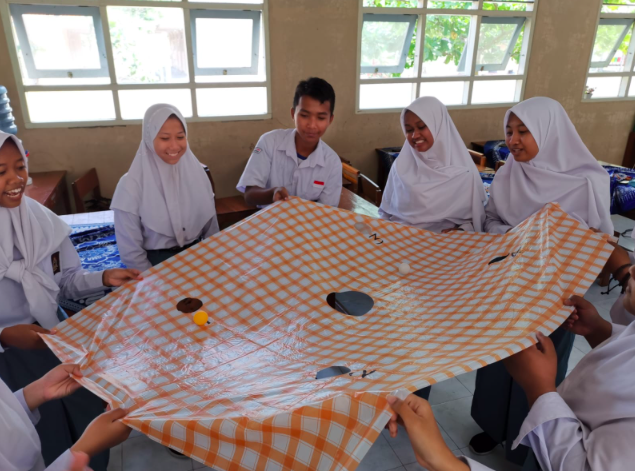 Students playing a game facilitated by Words on Wheels volunteers. Image courtesy of Sundram.
Students playing a game facilitated by Words on Wheels volunteers. Image courtesy of Sundram.
Together with Maurice and another friend, Sundram initiated the Bike to School project in Kampong Speu, Cambodia, which raises funds for bicycles for rural village children so that they can bike to school.
“Will I be like him when I reach my late 60s?” laughs Sundram. These people, he says, inspire him to do more and in turn inspire those around him.
Looking at him, I’m sure that he won’t be stopping anytime soon.
This sponsored piece made our writer want to volunteer more. Top image courtesy of Sundram.
If you like what you read, follow us on Facebook, Instagram, Twitter and Telegram to get the latest updates.
